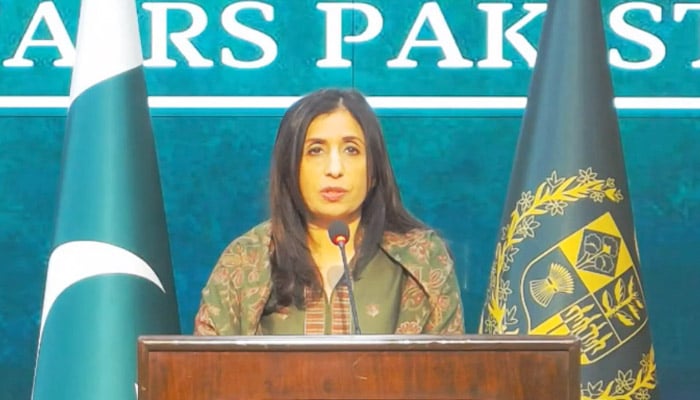Air strike prompts diplomatic row as Pakistan expels Iranian ambassador
Pakistan suspends all high-level visits between Islamabad and Tehran
ISLAMABAD: Pakistan said Wednesday it was calling back its ambassador to Iran, hours after Tehran launched an air strike in Islamabad, which it claimed was to target a "terrorist organisation".
"Pakistan has decided to recall its ambassador from Iran and that the Iranian Ambassador to Pakistan who is currently visiting Iran may not return for the time being," Foreign Office spokesperson Mumtaz Zahra Baloch said while addressing a press briefing in Islamabad.
The development comes after Tehran targeted the bases of, what it claimed was a terrorist organisation — Jaish al-Adl (Army of Justice) — inside Pakistani territory, "Green Mountain" with drones and missiles, and destroyed the headquarters of the said terrorist group, reported Iranian state media.
Calling it an "unprovoked and blatant" breach of Pakistan's sovereignty by Iran, Islamabad termed the move as a violation of international law and the purposes and principles of the Charter of the United Nations.
"This illegal act is completely unacceptable and has no justification whatsoever. Pakistan reserves the right to respond to this illegal act. The responsibility for the consequences will lie squarely with Iran," Baloch said.
Furthermore, the spokesperson also revealed that Islamabad has decided to suspend all high-level visits that were ongoing or were planned between Pakistan and Iran in the coming days.
Earlier, warning Tehran of "serious consequences", the FO had lamented that the "unacceptable violation" of Pakistani sovereignty took place despite the existence of several channels of communication between the two neighbouring countries.
Islamabad has already communicated strong condemnation of Tehran's move to the Iranian Charge d'affaires who was told that the consequences of such an unprovoked move lie squarely with Iran.
Reiterating Pakistan's stance on coordinated action against the scourge of terrorism, the spokesperson had underscored that such unilateral acts are not in conformity with good neighbourly relations and can seriously undermine bilateral trust and confidence.
A day earlier, Tehran's Islamic Revolutionary Guard Corps (IRGC) also launched missile attacks on multiple "terrorist" targets in Syria and in Iraq's autonomous Kurdistan region which destroyed "a spy headquarters" and a "gathering of anti-Iranian terrorist groups" in Arbil, the capital of Iraqi Kurdistan, the official IRNA news agency reported.
The move drew strong reactions from both Washington and Baghdad with the former terming the attacks as "reckless" and the latter recalling its ambassador from Tehran for consultations.
Earlier in the day, reacting to the Iranian strikes caretaker Balochistan Information Minister Jan Achakzai said that the move has damaged the relations between the two countries.
Terming Iran's attack as "unacceptable" UK's Lord Tariq said that his prayers are with those who have lost loved ones.
Expressing shock at the Iranian missile attack, former prime minister Shehbaz Sharif termed the development "against the spirit of friendship and principles of good neighbourliness" which undermines the historic relations between the two countries.
Weighing in on Iran's strikes, China has called upon Islamabad and Tehran to exercise "restraint" and avoid actions that would lead to an escalation of tension and work together to maintain peace and stability.
'No tit-for-tat reponse'
Speaking to Geo News, former foreign secretary Aizaz Ahmad Chaudhry condemned Iranian air attacks in Balochistan, terming them a breach of the territorial integrity of Pakistan.
"Terrorism is a common threat to both countries, however, territorial integrity shouldn't be breached,” the diplomat said, adding Iran shouldn't get involved in such unilateral actions and that it is not a good option for its bid to make things better.
Aizaz recommended both countries stay calm and deal with all issues amicably instead of worsening ties.
The ex-foreign secretary said Islamabad has given a "very tough" and "just" response to Tehran following the unprovoked and blatant breach of Pakistan's sovereignty.
"Islamabad has also had complaints with Tehran. Indian spy Kulbhushan Jadhav entered Pakistani territory from Iran. Former Taliban top leader Mullah Akhtar Mansoor had also used the Iranian border and the transborder movement of BLA militants," he continued.
However, Islamabad had always shown patience on several events to settle things diplomatically instead of escalating matters with unilateral moves.
"Despite a tough response, the matters shouldn't be escalated as we are not going to war."
He endorsed the foreign ministry's statement over the Iranian air strikes, saying: "There are several channels between both countries to discuss issues but Iran chose not to use them. However, both sides should not escalate matters."
The diplomat recommended: "Pakistan should seriously take up this matter diplomatically with Iran. I would not suggest a tit-for-tat response from Pakistan's side."
He stressed Pakistan constitute a National Security Council like other countries where civil-military leadership could make concrete decisions.
He also suggested the Pakistani government critically review national security policy and diplomatic options to maintain ties with its regional neighbours.
-
Security forces gun down 30 terrorists in multiple IBOs in KP: ISPR
-
MQM-P calls for new province in Sindh
-
US report validates Pakistan military edge over India: PM
-
Banned TTP poses serious threat to Pakistan security: UNSC panel
-
CM Afridi clarifies remarks on by-poll after ECP requests army deployment
-
Dubai sees 3.2m Pakistani passengers in 2025 as airport sets new milestone
-
Security forces kill 23 Indian proxy terrorists in KP's Kurram
-
Pakistan to construct island to boost oil exploration: report












